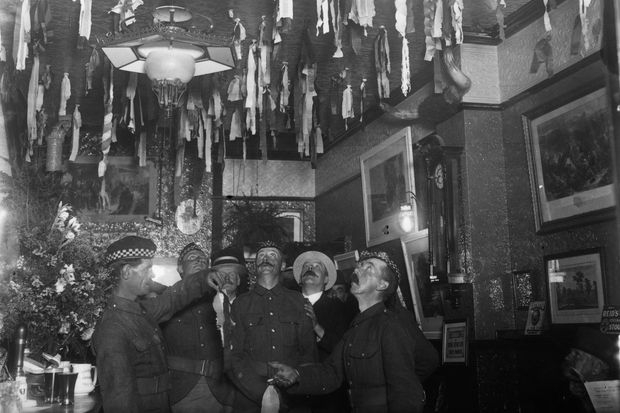From ‘The Menace of Drink’, The Spectator, 24 April 1915:
Some depressing influence is at work among the very poor which is not poverty, something which makes the full effort after the highest civilization attainable to them seem not worth while. That depressing influence is, as we believe, drink.
“Oh, hold your tongue!” we hear some one say. “Every fanatic, and tract-writer, and cheap moralist, and goody-goody parson, and old-maidish district visitor has been shouting that word for years. We are sick of hearing it. It may be very true that drink is responsible for a small output of munitions, but to make it responsible for the condition of the urban poor is nonsense. Dealers in that argument are altogether too superficial. When will they learn that drink is not a cause but an effect? When will they go down a little deeper and cease this Puritanical cant?”
We do not much wonder at this indignation. The ill effects of drink are so very obvious that very stupid people can see them and point them out in a very dull manner. On the other hand, it must be admitted that a great deal of blindness comes now from persistent grubbing beneath the obvious. If only these thought-moles would consent to stop on the surface for a bit and look about them, truth might find better exponents. At present life below a certain social level is altogether darkened by drink, not because everybody drinks, but because they are likely to do so. Two young people marry and set up house, or rather set up home, for they will not have more than two rooms. Some sort of romance hangs about their union, and they are happy. The man is in regular work, the woman in good health. But their happiness is under a continual menace. He may take to drink. If he does, the romance will be gone, and the money will be just insufficient for the tiny margin which means “a standard.”
That is not the whole of the menace. How will the drink take him? If it makes him angry, his wife will become more or less afraid of him. This means a good deal of nervous suffering when her children are coming, and she baa no heart for the always uphill task of keeping up a standard at such a time. When the children are there, they must be fed and must be clothed. If the man drinks even a little, there is too little to do it upon. The menace of illness is always impending because it cannot be afforded. There is always the menace of the bad example of drunken associates on the boys. Often the hard work and vigilance necessary to “get them into good ways” seem scarcely worth while.
And then there is the further fear of the girl’s marriage to some one who drinks. Not long ago a clergyman in Whitechapel told the present writer that many Christian girls marry Jews because they think that in the matter of drink they have less to fear from them. It may not be that a man drinks very mach or very regularly, but if be does it sometimes be may do it at any time. It may always at any moment mean physical violence or loss of work, and either in its various ways means ruin—i.e., loss of the happiness which makes life worth having.
It is mere absurdity and priggishness to pile the blame for all this upon men and none upon women. Some women drink, and the effect of their excesses upon their children is dire. Moreover, they have not the excuse of a too easy public opinion. There is no one in any class who ever excuses a woman for getting drunk. On the other band, it must be remembered that, while in a huge city like London the drunken women make a great show, the proportion of women who take to drink at all is a very small one, and it is rare indeed for the wife of a sober man to do it.
If as few men drank as women, our population would be sober. Again, it is unfair to the slum-dwelling man who drinks to say that if the comfortable classes can keep sober, so can he. The comfortable classes drank while it was the fashion. Public opinion has now made it as rare among better-class men as among lower- class women. How many men of any class can break wholly free from the habits created by fashion? Where drinking is usual men and women alike live under a menace—for a ruinous temptation is a menace. Can anything deliver them but their own determination? Can anything give them determination but time to think the matter soberly out? They think slower than the educated.






Comments